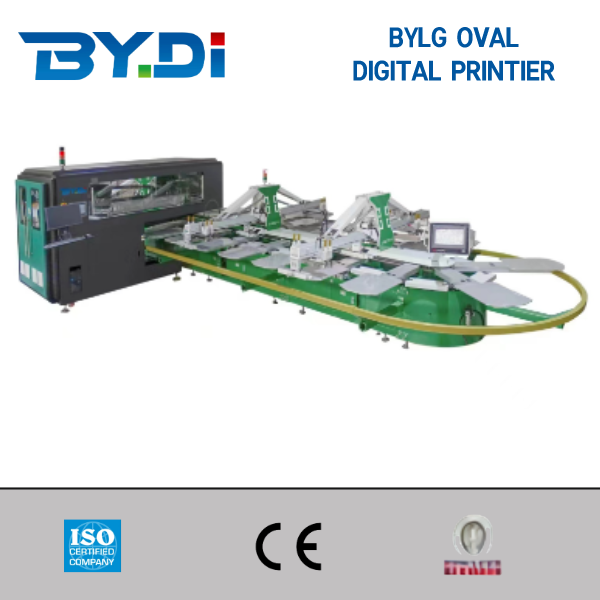
| Printing Thickness | 2-30mm |
| Max Printing Size | 750mm x 530mm |
| System | WIN7/WIN10 |
| Production Speed | 425PCS-335PCS |
| Image Type | JPEG/TIFF/BMP |
| Ink Color | CMYK ORBG LCLM |
| Types of Ink | Pigment |
| RIP Software | Neostampa/Wasatch/Texprint |
| Fabric | Cotton, Linen, Polyester, Nylon, Blend |
Based on recent authoritative studies, modern fabric printers like those from BYDI manufacturer utilize advanced inkjet technology to enhance print resolution and speed. The process involves precise ink distribution controlled by software that optimizes color accuracy and reduces ink wastage. The integration of Ricoh heads provides industrial-grade performance, ensuring consistent quality on diverse fabric types. Research highlights the importance of maintaining optimal environmental conditions to maximize printer efficiency and longevity.
According to industry research, fabric printing technology is pivotal in sectors such as fashion, home décor, and promotional goods. The manufacturer's Printer That Prints On Fabric is ideal for creating customized apparel, enhancing interior designs with unique patterns on upholstery, and producing vibrant advertising materials. These printers adapt to varied market demands, offering flexibility and customization across different applications.
Our manufacturer offers a comprehensive after-sales service, including a one-year guarantee, free samples, online and offline training, and ongoing support from our technical team. Customers can rely on quick resolution of issues through direct support from both our headquarters and our partners, like Ricoh.
Products are securely packaged following international shipping standards to ensure safe transport. The manufacturer collaborates with global shipping agents to facilitate timely and secure delivery, minimizing transit-related risks.
The printer is designed to work with cotton, linen, polyester, nylon, and blended materials, offering flexibility for diverse textile applications.
With its negative pressure ink path control system and degassing system, the printer ensures consistent performance without interruptions.
Yes, it operates efficiently on both Windows 7 and Windows 10, integrating smoothly with existing software setups.
The manufacturer provides both online and offline training sessions to ensure users can maximize the printer's capabilities.
The system automatically moisturizes and cleans the print heads to prevent clogging and maintain optimal print quality.
Yes, updates can be performed directly from the manufacturer's headquarters, ensuring the system stays current with technological advancements.
The printer can produce between 335 to 425 pieces, based on the selected resolution and pass settings.
Ricoh heads are chosen for their high precision, durability, and performance, meeting industrial-grade production requirements.
Technical support is available from both the manufacturer's team and Ricoh experts, offering direct assistance for any problems.
Yes, the printer comes with a one-year warranty, providing assurance of quality and reliability.
The use of Ricoh technology in fabric printers allows for high-speed, precise inkjet printing, which is crucial for industrial applications. This technology enhances print quality and reliability, making it a preferred choice for manufacturers.
Digital advancements have transformed fabric printing by introducing high-resolution, full-color capabilities. This evolution enables more detailed and customized designs, catering to niche markets and reducing production times.
Digital fabric printing has revolutionized the textile industry by enabling sustainable production practices, reducing waste, and providing customization options. It supports the demand for fast fashion by allowing quick design-to-product cycles.
Direct-to-garment (DTG) is ideal for cotton fabrics and detailed designs, while dye-sublimation works best with polyester, offering vibrant colors and durability. Both methods have unique applications based on material requirements.
Modern fabric printing reduces water usage and chemical waste by utilizing digital techniques, making it a more sustainable choice. These advancements align with eco-friendly production standards.
RIP software is crucial for managing color profiles and print layouts, ensuring precise color reproduction and efficient ink usage, which are essential for achieving high-quality prints.
Automation in fabric printers enhances efficiency by streamlining maintenance and reducing manual intervention, allowing for higher productivity and reduced downtime during long print runs.
The global market for fabric printing technology is growing due to increased demand for customization, sustainability, and faster production cycles, with emerging markets adopting digital solutions rapidly.
Manufacturers face challenges like maintaining print head technology, adapting to rapid technological changes, and meeting diverse customer demands for customization and quality.
The future of fabric printing includes advancements in printable materials, ink formulations, and faster, more efficient printing technology, enhancing customization and sustainability in production.






Leave Your Message